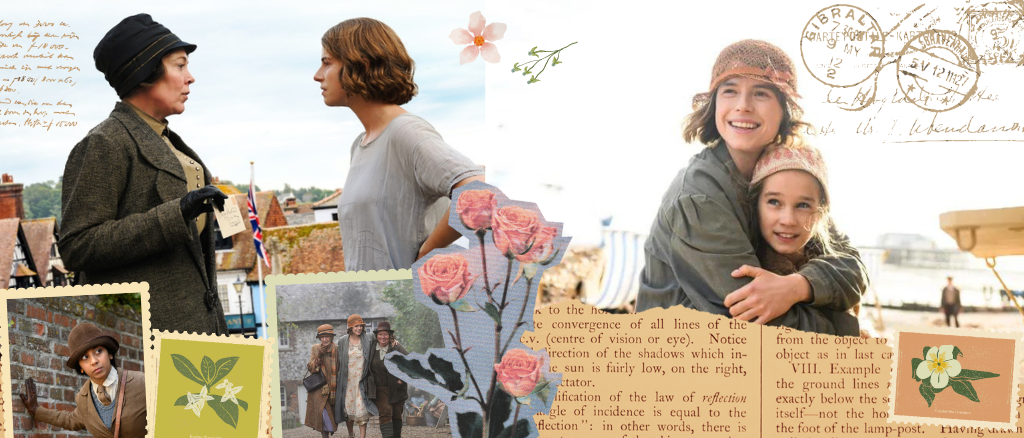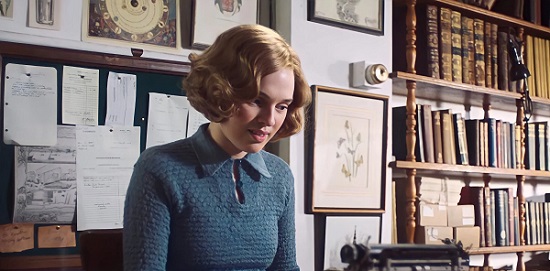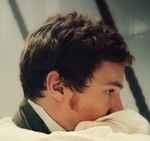
Forum des amoureux de la littérature et de la culture anglaise
|
Bienvenue sur Whoopsy Daisy
Whoopsy Daisy n'est pas un blog, mais un forum participatif: participez !
|
|
| | Les écrivains dans les séries télé |  |
| | | Auteur | Message |
|---|
Emjy
Bookworm

 |  Sujet: Les écrivains dans les séries télé Sujet: Les écrivains dans les séries télé  Sam 21 Mar - 18:20 Sam 21 Mar - 18:20 | |
| A l'occasion de la diffusion d' Arthur & George sur ITV, The Guardian a publié un article intéressant sur la représentation des écrivains à la télévision.  J'ai noté des titres de séries que je ne connaissais pas. L'article cite notamment Miss Austen regrets et le futur biopic des sœurs Brontë scénarisée par Sally Wainwright. - Citation :
- From Murder She Wrote to Arthur & George: the tricky job of showing writers on TV
Writing is not particularly interesting to watch. So television has to do some fancy footwork to keep it visual – such as by having writers never do any work

Arthur and George … based on a book, and about a writer. Photograph: Neil Genower/Neil Genower
The novelist Robert Harris recently criticised broadcasters – and especially the BBC – for not doing enough to cover books. This recurrent debate, though, depends on your definition of coverage. Harris seemed to mean publicity, calling for television chat shows dedicated to literature. But for viewers who remember when Play for Today and other strands regularly screened scripts originally written for the medium, TV can sometimes seem too dependent on books.
The big winter dramas on the BBC’s main channels were The Casual Vacancy and Wolf Hall, derived from bestsellers by JK Rowling and Hilary Mantel respectively, while even ITV, which has no public service remit to support reading, is currently airing a three-part version of Julian Barnes’ 2005 novel Man Booker prize-shortlisted novel Arthur & George. This one should earn double “Harris points” because not only does it come from a novel but the central character is a novelist – so extending the small list of dramas that have attempted to put the life of a writer on screen.
Primarily that’s because the act of literary composition is inherently undramatic, happening largely in the subconscious, almost always silently and over long periods of time. The result is the visual cliche of a writer playing waste-bin basketball with rolled-up sheets of blank paper, which might be ridiculous but is at least more interesting than the contemporary equivalent of an author staring blankly at an equally unblinking screen. Although some novelists do, in fact, speak their words aloud after writing them, it seems a hammily unrealistic device if one does so on screen.
So the first rule of dramatising authors is that they should do as little writing as possible. And Arthur & George is careful to avoid becoming Author and George, Ed Whitmore’s scripts helped by the fact that the Barnes novel was itself wary of writing about writing. Sir Arthur Conan Doyle pointedly tells the publishers that they can wait for the next Sherlock Holmes book while he investigates a potential real-life miscarriage of justice.
The use of a detective novelist as an investigator echoes TV’s highest-profile writer-protagonist: Murder She Wrote (CBS, 1984-2007). Some of the episodes featuring Angela Lansbury as crime-writer Jessica Fletcher turned on aspects of the writing life – publicity tours, visits to the sets of movie adaptations – and occasional instalments purported to be dramatisations of Jessica’s stories; but sleuthing was the work that the character was mainly seen doing.
Apart from Mrs Fletcher, the novelist character brought to the broadest audience was Mel Hutchwright, the author of a Northern realist novel called Hard Grinding, who was played in several episodes of Coronation Street by Sir Ian McKellen. The suggestion that Hutchwright was a fake or poseur seemed typical of a fear in TV that mainstream viewers will find literature boring or pretentious.
When the subject of the drama is a well-known actual writer, a crucial question is to what extent the manner or personality should reflect the work. Whereas Barnes avoided any structural or prose pastiche of the Holmes stories, the TV Arthur & George makes allusions as loud as the howl of the hound of the Baskervilles. Conan Doyle, for instance, frequently makes deductions or assumptions from a first sight of someone. As the insights are often medical and the writer was a qualified doctor, these moments are biographically plausible; viewers may diagnose painful ribs as a result of Sherlockian nudging from the script.
Yet, as literary biography is increasingly determined to make connections between the writer and the work, it’s hard to blame TV dramas for succumbing to the same temptation. Jane Austen has always been particularly vulnerable to the thesis that the romantic pursuits in her fiction were inspired by factual or fantasy passions of her own. A prime example was Miss Austen Regrets, transmitted by the BBC in 2008, the same year in which ITV screened Lost In Austen, which at least came with the time-travel twist of a keen modern Jane-ite slipping back into the plot of Pride and Prejudice.
The Brontë sisters have rivaled Austen in inviting work-love-life speculation. A 1973 ITV five-parter The Brontës of Haworth – written by the verse dramatist Christopher Fry, although these scripts were in prose – was decorous about making connections. So it will be fascinating to see what Sally Wainwright (Happy Valley, Last Tango in Halifax) does with the material in the biopic about Charlotte, Emily and Anne she is currently writing for the BBC.
Contrastingly, England’s greatest writer has encouraged dramatists to explore the lack of overlap between his plays and what is known of his life. Will Shakespeare – a six-part ITV series, shown in the summer of 1978 – took the approach, later also followed in the movie Shakespeare in Love, of contradicting the solemn figure shown on the front of school textbooks by showing a drinking and wenching young roisterer. The scripts were written by John Mortimer, who had created for the same network an Old Bailey relative of Shakespeare’s Falstaff in Horace Rumpole.
Ducking under the bookshelf in much the same way, the BBC drama Love Again (2003), with Hugh Bonneville as Philip Larkin, avoided as far as possible the fact that the protagonist was a poet and depicted him as a philanderer and librarian. They were certainly two aspects of his life but not perhaps those of most interest to posterity.
The distant transmission dates of many of these examples seem to reveal a shift in TV’s attitude to fictionalising writers. It is hard to imagine ITV now screening a mini-series about William Shakespeare, unless, perhaps, he were investigating the murder of Christopher Marlowe.
Nor would the current BBC2 be likely to run a series such as Don’t Forget to Write, a comedy-drama about two British theatre playwrights which, in the late 1970s, ran to two series full of theatrical in-jokes. Equally unrepeatable would be Unnatural Pursuits (BBC, 1992), written by Simon Gray, in which Alan Bates and Richard Wilson play satirical spins on Gray and his friend Harold Pinter.
If Gray, Pinter – and, indeed, Larkin – ever become dramatic characters on TV again, it will surely only be if a writer can come up with a plot in which they operate as detectives. _________________  |
|   | | Shelbylee
Bookworm

 |  Sujet: Re: Les écrivains dans les séries télé Sujet: Re: Les écrivains dans les séries télé  Sam 21 Mar - 19:31 Sam 21 Mar - 19:31 | |
| C'est vrai qu'il y a beaucoup d'écrivains dans les films, mais peu dans les séries. Je note la série sur Shakespeare par ITV. - Citation :
- It is hard to imagine ITV now screening a mini-series about William Shakespeare, unless, perhaps, he were investigating the murder of Christopher Marlowe.
Le pire c'est que j'aurais envie de la regarder  _________________  |
|   | | | | Les écrivains dans les séries télé |  |
|
Sujets similaires |  |
|
| | Permission de ce forum: | Vous ne pouvez pas répondre aux sujets dans ce forum
| |
| |
| |
|




